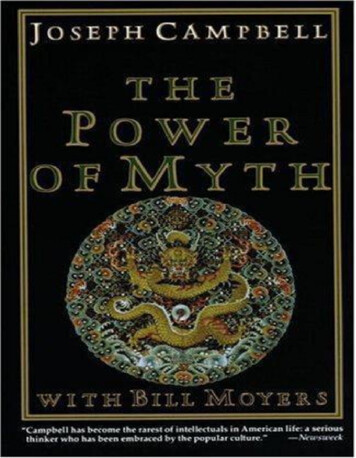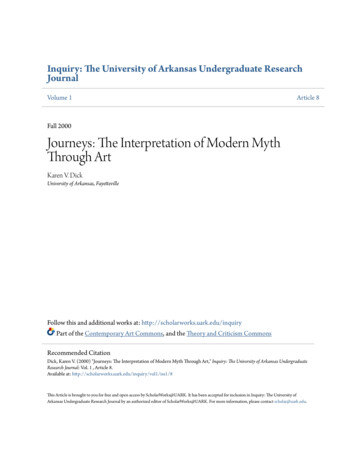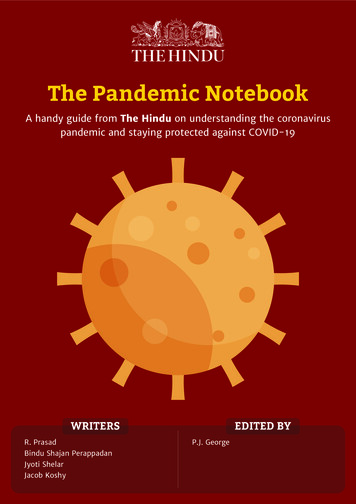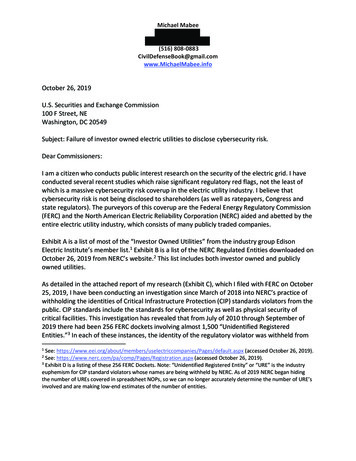
Transcription
The Power of MythJoseph Campbellwith Bill MoyersEditor's NoteIntroductionIMYTH AND THE MODERN WORLDIITHE JOURNEY INWARDIIITHE FIRST STORYTELLERSIVSACRIFICE AND BLISSTHE HERO'S ADVENTUREVITHE GIFT OF THE GODDESSVIITALES OF LOVE AND MARRIAGEVIIIMASKS OF ETERNITY
To Judith, who has long heard the music
Editor's NoteThis conversation between Bill Moyers andJoseph Campbell took place in 1985 and 1986 atGeorge Lucas' Skywalker Ranch and later at theMuseum of Natural History in New York. Many of uswho read the original transcripts were struck by the richabundance of material captured during the twenty-fourhours of filming -- much of which had to be cut inmaking the six-hour PBS series. The idea for a bookarose from the desire to make this material available notonly to viewers of the series but also to those who havelong appreciated Campbell through reading his books.In editing this book, I attempted to be faithful tothe flow of the original conversation while at the sametime taking advantage of the opportunity to weave inadditional material on the topic from wherever itappeared in the transcripts. When I could, I followedthe format of the TV series. But the book has its ownshape and spirit and is designed to be a companion to
the series, not a replica of it. The book exists, in part,because this is a conversation of ideas worth ponderingas well as watching.On a more profound level, of course, the bookexists because Bill Moyers was willing to address thefundamental and difficult subject of myth -- and becauseJoseph Campbell was willing to answer Moyers'penetrating questions with self-revealing honesty, basedon a lifetime of living with myth. I am grateful to both ofthem for the opportunity to witness this encounter, andto Jacqueline Kennedy Onassis, the Doubleday editor,whose interest in the ideas of Joseph Campbell was theprime mover in the publication of this book. I amgrateful, also, to Karen Bordelon, Alice Fisher, LynnCohea, Sonya Haddad, Joan Konner, and JohnFlowers for their support, and especially to MaggieKeeshen for her many retypings of the manuscript andfor her keen editorial eye. For help with the manuscript,I am grateful to Judy Doctoroff, Andie Tucher, BeckyBerman, and Judy Sandman. The major task ofillustration research was done by Vera Aronow, LynnNovick, Elizabeth Fischer, and Sabra Moore, with help
from Annmari Ronnberg. Both Bill Moyers and JosephCampbell read the manuscript and offered many helpfulsuggestions -- but I am grateful that they resisted thetemptation to rewrite their words into book talk.Instead, they let the conversation itself live on the page.-- BETTY SUE FLOWERSUniversity of Texas at Austin
IntroductionFor weeks after Joseph Campbell died, I wasreminded of him just about everywhere I turned.Coming up from the subway at Times Square andfeeling the energy of the pressing crowd, I smiled tomyself upon remembering the image that once hadappeared to Campbell there: "The latest incarnation ofOedipus, the continued romance of Beauty and theBeast, stands this afternoon on the corner of Fortysecond Street and Fifth Avenue, waiting for the trafficlight to change."At a preview of John Huston's last film, TheDead, based on a story by James Joyce, I thoughtagain of Campbell. One of his first important works wasa key to Finnegans Wake. What Joyce called "thegrave and constant" in human sufferings Campbell knewto be a principal theme of classic mythology. "Thesecret cause of all suffering," he said, "is mortality itself,which is the prime condition of life. It cannot be denied
if life is to be affirmed."Once, as we were discussing the subject ofsuffering, he mentioned in tandem Joyce and Igjugarjuk."Who is Igjugarjuk?" I said, barely able to imitate thepronunciation. "Oh," replied Campbell, "he was theshaman of a Caribou Eskimo tribe in northern Canada,the one who told European visitors that the only truewisdom 'lives far from mankind, out in the greatloneliness, and can be reached only through suffering.Privation and suffering alone open the mind to all that ishidden to others.' ""Of course," I said, "Igjugarjuk."Joe let pass my cultural ignorance. We hadstopped walking. His eyes were alight as he said, "Canyou imagine a long evening around the fire with Joyceand Igjugarjuk? Boy, I'd like to sit in on that."Campbell died just before the twenty-fourthanniversary of John F. Kennedy's assassination, atragedy he had discussed in mythological terms duringour first meeting years earlier. Now, as that melancholyremembrance came around again, I sat talking with mygrown children about Campbell's reflections. The
solemn state funeral he had described as "an illustrationof the high service of ritual to a society," evokingmythological themes rooted in human need. "This was aritualized occasion of the greatest social necessity,"Campbell had written. The public murder of apresident, "representing our whole society, the livingsocial organism of which ourselves were the members,taken away at a moment of exuberant life, required acompensatory rite to reestablish the sense of solidarity.Here was an enormous nation, made those four daysinto a unanimous community, all of us participating in thesame way, simultaneously, in a single symbolic event."He said it was "the first and only thing of its kind inpeacetime that has ever given me the sense of being amember of this whole national community, engaged as aunit in the observance of a deeply significant rite."That description I recalled also when one of mycolleagues had been asked by a friend about ourcollaboration with Campbell: "Why do you need themythology?" She held the familiar, modern opinion that"all these Greek gods and stuff" are irrelevant to thehuman condition today. What she did not know -- what
most do not know -- is that the remnants of all that"stuff" line the walls of our interior system of belief, likeshards of broken pottery in an archaeological site. Butas we are organic beings, there is energy in all that"stuff." Rituals evoke it. Consider the position of judgesin our society, which Campbell saw in mythological, notsociological, terms. If this position were just a role, thejudge could wear a gray suit to court instead of themagisterial black robe. For the law to hold authoritybeyond mere coercion, the power of the judge must beritualized, mythologized. So must much of life today,Campbell said, from religion and war to love and death.Walking to work one morning after Campbell'sdeath, I stopped before a neighborhood video storethat was showing scenes from George Lucas' StarWars on a monitor in the window. I stood there thinkingof the time Campbell and I had watched the movietogether at Lucas' Skywalker Ranch in California.Lucas and Campbell had become good friends after thefilmmaker, acknowledging a debt to Campbell's work,invited the scholar to view the Star Wars trilogy.Campbell reveled in the ancient themes and motifs of
mythology unfolding on the wide screen in powerfulcontemporary images. On this particular visit, havingagain exulted over the perils and heroics of LukeSkywalker, Joe grew animated as he talked about howLucas "has put the newest and most powerful spin" tothe classic story of the hero."And what is that?" I asked."It's what Goethe said in Faust but which Lucashas dressed in modern idiom -- the message thattechnology is not going to save us. Our computers, ourtools, our machines are not enough. We have to rely onour intuition, our true being.""Isn't that an affront to reason?" I said. "And aren'twe already beating a hasty retreat from reason, as it is?""That's not what the hero's journey is about. It'snot to deny reason. To the contrary, by overcoming thedark passions, the hero symbolizes our ability to controlthe irrational savage within us." Campbell had lamentedon other occasions our failure "to admit within ourselvesthe carnivorous, lecherous fever" that is endemic tohuman nature. Now he was describing the hero'sjourney not as a courageous act but as a life lived in
self-discovery, "and Luke Skywalker was never morerational than when he found within himself the resourcesof character to meet his destiny."Ironically, to Campbell the end of thehero's journey is not the aggrandizement of the hero. "Itis," he said in one of his lectures, "not to identify oneselfwith any of the figures or powers experienced. TheIndian yogi, striving for release, identifies himself withthe Light and never returns. But no one with a will to theservice of others would permit himself such an escape.The ultimate aim of the quest must be neither releasenor ecstasy for oneself, but the wisdom and the powerto serve others." One of the many distinctions betweenthe celebrity and the hero, he said, is that one lives onlyfor self while the other acts to redeem society.Joseph Campbell affirmed life as adventure. "Tohell with it," he said, after his university adviser tried tohold him to a narrow academic curriculum. He gave upon the pursuit of a doctorate and went instead into thewoods to read. He continued all his life to read booksabout the world: anthropology, biology, philosophy, art,history, religion. And he continued to remind others that
one sure path into the world runs along the printedpage. A few days after his death, I received a letterfrom one of his former students who now helps to edit amajor magazine. Hearing of the series on which I hadbeen working with Campbell, she wrote to share howthis man's "cyclone of energy blew across all theintellectual possibilities" of the students who sat"breathless in his classroom" at Sarah LawrenceCollege. "While all of us listened spellbound," shewrote, "we did stagger under the weight of his weeklyreading assignments. Finally, one of our number stoodup and confronted him (Sarah Lawrence style), saying:'I am taking three other courses, you know. All of themassigned reading, you know. How do you expect me tocomplete all this in a week?' Campbell just laughed andsaid, 'I'm astonished you tried. You have the rest ofyour life to do the reading.' "She concluded, "And I still haven't finished -- thenever ending example of his life and work."One could get a sense of that impact at thememorial service held for him at the Museum of NaturalHistory in New York. Brought there as a boy, he had
been transfixed by the totem poles and masks. Whomade them? he wondered. What did they mean? Hebegan to read everything he could about Indians, theirmyths and legends. By ten he was into the pursuit thatmade him one of the world's leading scholars ofmythology and one of the most exciting teachers of ourtime; it was said that "he could make the bones offolklore and anthropology live." Now, at the memorialservice in the museum where three quarters of a centuryearlier his imagination had first been excited, peoplegathered to pay honor to his memory. There was aperformance by Mickey Hart, the drummer for theGrateful Dead, the rock group with whom Campbellshared a fascination with percussion. Robert Bly playeda dulcimer and read poetry dedicated to Campbell.Former students spoke, as did friends whom he hadmade after he retired and moved with his wife, thedancer Jean Erdman, to Hawaii. The great publishinghouses of New York were represented. So werewriters and scholars, young and old, who had foundtheir pathbreaker in Joseph Campbell.And journalists. I had been drawn to him eight
years earlier when, self-appointed, I was attempting tobring to television the lively minds of our time. We hadtaped two programs at the museum, and socompellingly had his presence permeated the screenthat more than fourteen thousand people wrote askingfor transcripts of the conversations. I vowed then that Iwould come after him again, this time for a moresystematic and thorough exploration of his ideas. Hewrote or edited some twenty books, but it was as ateacher that I had experienced him, one rich in the loreof the world and the imagery of language, and I wantedothers to experience him as teacher, too. So the desireto share the treasure of the man inspired my PBS seriesand this book.A journalist, it is said, enjoys a license to beeducated in public; we are the lucky ones, allowed tospend our days in a continuing course of adulteducation. No one has taught me more of late thanCampbell, and when I told him he would have to bearthe responsibility for whatever comes of having me as apupil, he laughed and quoted an old Roman: "The fateslead him who will; him who won't they drag."
He taught, as great teachers teach, by example. Itwas not his manner to try to talk anyone into anything(except once, when he persuaded Jean to marry him).Preachers err, he told me, by trying "to talk people intobelief; better they reveal the radiance of their owndiscovery." How he did reveal a joy for learning andliving! Matthew Arnold believed the highest criticism is"to know the best that is known and thought in theworld, and by in its turn making this known, to create acurrent of true and fresh ideas." This is what Campbelldid. It was impossible to listen to him -- truly to hearhim -- without realizing in one's own consciousness astirring of fresh life, the rising of one's own imagination.He agreed that the "guiding idea" of his work wasto find "the commonality of themes in world myths,pointing to a constant requirement in the human psychefor a centering in terms of deep principles.""You're talking about a search for the meaning oflife?" I asked."No, no, no," he said. "For the experience ofbeing alive."I have said that mythology is an interior road map
of experience, drawn by people who have traveled it.He would, I suspect, not settle for the journalist'sprosaic definition. To him mythology was "the song ofthe universe," "the music of the spheres" -- music wedance to even when we cannot name the tune. We arehearing its refrains "whether we listen with aloofamusement to the mumbo jumbo of some witch doctorof the Congo, or read with cultivated rapturetranslations from sonnets of Lao-tsu, or now and againcrack the hard nutshell of an argument of Aquinas, orcatch suddenly the shining meaning of a bizarreEskimoan fairy tale."He imagined that this grand and cacophonouschorus began when our primal ancestors told stories tothemselves about the animals that they killed for foodand about the supernatural world to which the animalsseemed to go when they died. "Out there somewhere,"beyond the visible plain of existence, was the "animalmaster," who held over human beings the power of lifeand death: if he failed to send the beasts back to besacrificed again, the hunters and their kin would starve.Thus early societies learned that "the essence of life is
that it lives by killing and eating; that's the great mysterythat the myths have to deal with." The hunt became aritual of sacrifice, and the hunters in turn performed actsof atonement to the departed spirits of the animals,hoping to coax them into returning to be sacrificedagain. The beasts were seen as envoys from that otherworld, and Campbell surmised "a magical, wonderfulaccord" growing between the hunter and the hunted, asif they were locked in a "mystical, timeless" cycle ofdeath, burial, and resurrection. Their art -- the paintingson cave walls -- and oral literature gave form to theimpulse we now call religion.As these primal folk turned from hunting toplanting, the stories they told to interpret the mysteriesof life changed, too. Now the seed became the magicsymbol of the endless cycle. The plant died, and wasburied, and its seed was born again. Campbell wasfascinated by how this symbol was seized upon by theworld's great religions as the revelation of eternal truth - that from death comes life, or as he put it: "Fromsacrifice, bliss.""Jesus had the eye," he said. "What a magnificent
reality he saw in the mustard seed." He would quote thewords of Jesus from the gospel of John -- "Truly, truly,I say unto you, unless a grain of wheat falls into theearth and dies, it remains alone; but if it dies, it bearsmuch fruit" -- and in the next breath, the Koran: "Doyou think that you shall enter the Garden of Blisswithout such trials as came to those who passed awaybefore you?" He roamed this vast literature of the spirit,even translating the Hindu scriptures from Sanskrit, andcontinued to collect more recent stories which he addedto the wisdom of the ancients. One story he especiallyliked told of the troubled woman who came to theIndian saint and sage Ramakrishna, saying, "O Master,I do not find that I love God." And he asked, "Is therenothing, then, that you love?" To this she answered,"My little nephew." And he said to her, "There is yourlove and service to God, in your love and service to thatchild.""And there," said Campbell, "is the high messageof religion: 'Inasmuch as ye have done it unto one of theleast of these. . .' "A spiritual man, he found in the literature of faith
those principles common to the human spirit. But theyhad to be liberated from tribal lien, or the religions ofthe world would remain -- as in the Middle East andNorthern Ireland today -- the source of disdain andaggression. The images of God are many, he said,calling them "the masks of eternity" that both cover andreveal "the Face of Glory." He wanted to know what itmeans that God assumes such different masks indifferent cultures, yet how it is that comparable storiescan be found in these divergent traditions -- stories ofcreation, of virgin births, incarnations, death andresurrection, second comings, and judgment days. Heliked the insight of the Hindu scripture: "Truth is one; thesages call it by many names." All our names and imagesfor God are masks, he said, signifying the ultimatereality that by definition transcends language and art. Amyth is a mask of God, too -- a metaphor for what liesbehind the visible world. However the mystic traditionsdiffer, he said, they are in accord in calling us to adeeper awareness of the very act of living itself. Theunpardonable sin, in Campbell's book, was the sin ofinadvertence, of not being alert, not quite awake.
I never met anyone who could better tell a story.Listening to him talk of primal societies, I wastransported to the wide plains under the great dome ofthe open sky, or to the forest dense, beneath a canopyof trees, and I began to understand how the voices ofthe gods spoke from the wind and thunder, and thespirit of God flowed in every mountain stream, and thewhole earth bloomed as a sacred place -- the realm ofmythic imagination. And I asked: Now that we modernshave stripped the earth of its mystery -- have made, inSaul Bellow's description, "a housecleaning of belief" -how are our imaginations to be nourished? ByHollywood and made-for-TV movies?Campbell was no pessimist. He believed there is a"point of wisdom beyond the conflicts of illusion andtruth by which lives can be put back together again."Finding it is the "prime question of the time." In his finalyears he was striving for a new synthesis of science andspirit. "The shift from a geocentric to a heliocentricworld view," he wrote after the astronauts touched themoon, "seemed to have removed man from the center - and the center seemed so important. Spiritually,
however, the center is where sight is. Stand on a heightand view the horizon. Stand on the moon and view thewhole earth rising -- even, by way of television, in yourparlor." The result is an unprecedented expansion ofhorizon, one that could well serve in our age, as theancient mythologies did in theirs, to cleanse the doors ofperception "to the wonder, at once terrible andfascinating, of ourselves and of the universe." He arguedthat it is not science that has diminished human beings ordivorced us from divinity. On the contrary, the newdiscoveries of science "rejoin us to the ancients" byenabling us to recognize in this whole universe "areflection magnified of our own most inward nature; sothat we are indeed its ears, its eyes, its thinking, and itsspeech -- or, in theological terms, God's ears, God'seyes, God's thinking, and God's Word." The last time Isaw him I asked him if he still believed -- as he oncehad written -- "that we are at this moment participatingin one of the very greatest leaps of the human spirit to aknowledge not only of outside nature but also of ourown deep inward mystery."He thought a minute and answered, "The greatest
ever."When I heard the news of his death, Itarried awhile in the copy he had given me of The Herowith a Thousand Faces. And I thought of the time Ifirst discovered the world of the mythic hero. I hadwandered into the little public library of the town whereI grew up and, casually exploring the stacks, pulleddown a book that opened wonders to me: Prometheus,stealing fire from the gods for the sake of the humanrace; Jason, braving the dragon to seize the GoldenFleece; the Knights of the Round Table, pursuing theHoly Grail. But not until I met Joseph Campbell did Iunderstand that the Westerns I saw at the Saturdaymatinees had borrowed freely from those ancient tales.And that the stories we learned in Sunday schoolcorresponded with those of other cultures thatrecognized the soul's high adventure, the quest ofmortals to grasp the reality of God. He helped me tosee the connections, to understand how the pieces fit,and not merely to fear less but to welcome what hedescribed as "a mighty multicultural future."He was, of course, criticized for dwelling on the
psychological interpretation of myth, for seeming toconfine the contemporary role of myth to either anideological or a therapeutic function. I am notcompetent to enter that debate, and leave it for othersto wage. He never seemed bothered by thecontroversy. He just kept on teaching, opening othersto a new way of seeing.It was, above all, the authentic life he lived thatinstructs us. When he said that myths are clues to ourdeepest spiritual potential, able to lead us to delight,illumination, and even rapture, he spoke as one whohad been to the places he was inviting others to visit.What did draw me to him?Wisdom, yes; he was very wise.And learning; he did indeed "know the vast sweepof our panoramic past as few men have ever known it."But there was more.A story's the way to tell it. He was a man with athousand stories. This was one of his favorites. In Japanfor an international conference on religion, Campbelloverheard another American delegate, a socialphilosopher from New York, say to a Shinto priest,
"We've been now to a good many ceremonies and haveseen quite a few of your shrines. But I don't get yourideology. I don't get your theology." The Japanesepaused as though in deep thought and then slowlyshook his head. "I think we don't have ideology," hesaid. "We don't have theology. We dance."And so did Joseph Campbell -- to the music ofthe spheres.-- BILL MOYERSI
MYTH AND THE MODERN WORLDPeople say that what we're all seeking is ameaning for life. 1 don't think that's what we'rereally seeking. I think that what we're seeking is anexperience of being alive, so that our lifeexperiences on the purely physical plane will haveresonances within our own innermost being andreality, so that we actually feel the rapture of beingalive.MOYERS: Why myths? Why should wecare about myths? What do they have to do with mylife?CAMPBELL: My first response wouldbe, "Go on, live your life, it's a good life -- you don'tneed mythology." I don't believe in being interested in asubject just because it's said to be important. I believein being caught by it somehow or other. But you mayfind that, with a proper introduction, mythology willcatch you. And so, what can it do for you if it does
catch you?One of our problems today is that we are not wellacquainted with the literature of the spirit. We'reinterested in the news of the day and the problems ofthe hour. It used to be that the university campus was akind of hermetically sealed-off area where the news ofthe day did not impinge upon your attention to the innerlife and to the magnificent human heritage we have inour great tradition -- Plato, Confucius, the Buddha,Goethe, and others who speak of the eternal values thathave to do with the centering of our lives. When you getto be older, and the concerns of the day have all beenattended to, and you turn to the inner life -- well, if youdon't know where it is or what it is, you'll be sorry.Greek and Latin and biblical literature used to bepart of everyone's education. Now, when these weredropped, a whole tradition of Occidental mythologicalinformation was lost. It used to be that these storieswere in the minds of people. When the story is in yourmind, then you see its relevance to something happeningin your own life. It gives you perspective on what'shappening to you. With the loss of that, we've really lost
something because we don't have a comparableliterature to take its place. These bits of informationfrom ancient times, which have to do with the themesthat have supported human life, built civilizations, andinformed religions over the millennia, have to do withdeep inner problems, inner mysteries, inner thresholdsof passage, and if you don't know what the guide-signsare along the way, you have to work it out yourself. Butonce this subject catches you, there is such a feeling,from one or another of these traditions, of informationof a deep, rich, life-vivifying sort that you don't want togive it up.MOYERS: So we tell stories to try tocome to terms with the world, to harmonize our liveswith reality?CAMPBELL: I think so, yes. Novels -great novels -- can be wonderfully instructive. In mytwenties and thirties and even on into my forties, JamesJoyce and Thomas Mann were my teachers. I readeverything they wrote. Both were writing in terms ofwhat might be called the mythological traditions. Take,for example, the story of Tonio, in Thomas Mann's
Tonio Kröger. Tonio's father was a substantialbusinessman, a major citizen in his hometown. LittleTonio, however, had an artistic temperament, so hemoved to Munich and joined a group of literary peoplewho felt themselves above the mere money earners andfamily men.So here is Tonio between two poles: his father,who was a good father, responsible and all of that, butwho never did the thing he wanted to in all his life -and, on the other hand, the one who leaves hishometown and becomes a critic of that kind of life. ButTonio found that he really loved these hometownpeople. And although he thought himself a little superiorin an intellectual way to them and could describe themwith cutting words, his heart was nevertheless withthem.But when he left to live with the bohemians, hefound that they were so disdainful of life that he couldn'tstay with them, either. So he left them, and wrote aletter back to someone in the group, saying, "I admirethose cold, proud beings who adventure upon the pathsof great and daemonic beauty and despise 'mankind';
but I do not envy them. For if anything is capable ofmaking a poet of a literary man, it is my hometown loveof the human, the living and ordinary. All warmthderives from this love, all kindness and all humor.Indeed, to me it even seems that this must be that loveof which it is written that one may 'speak with thetongues of men and of angels,' and yet, lacking love, be'as sounding brass or a tinkling cymbal.' "And then he says, "The writer must be true totruth." And that's a killer, because the only way you candescribe a human being truly is by describing hisimperfections. The perfect human being is uninteresting-- the Buddha who leaves the world, you know. It isthe imperfections of life that are lovable. And when thewriter sends a dart of the true word, it hurts. But it goeswith love. This is what Mann called "erotic irony," thelove for that which you are killing with your cruel,analytical word.MOYERS: I cherish that image: myhometown love, the feeling you get for that place, nomatter how long you've been away or even if you neverreturn. That was where you first discovered people. But
why do you say you love people for theirimperfections?.CAMPBELL: Aren't children lovablebecause they're falling down all the time and have littlebodies with the heads too big? Didn't Walt Disneyknow all about this when he did the seven dwarfs? Andthese funny little dogs that people have -- they'relovable because they're so imperfect.MOYERS: Perfection would be a bore,wouldn't it?CAMPBELL: It would have to be. Itwould be inhuman. The umbilical point, the humanity,the thing that makes you human and not supernaturaland immortal -- that's what's lovable. That is why somepeople have a very hard time loving God, becausethere's no imperfection there. You can be in awe, butthat would not be real love. It's Christ on the cross thatbecomes lovable.MOYERS: What do you mean?CAMPBELL: Suffering. Suffering isimperfection, is it not?MOYERS: The story of human suffering,
striving, living -CAMPBELL: -- and youth coming toknowledge of itself, what it has to go through.MOYERS: I came to understand fromreading your books -- The Masks of God or The Herowith a Thousand Faces, for example -- that whathuman beings have in common is revealed in myths.Myths are stories of our search through the ages fortruth, for meaning, for significance. We all need to tellour story and to understand our story. We all need tounderstand death and to cope with death, and we allneed help in our passages from birth to life and then todeath. We need for life to signify, to touch the eternal,to understand the mysterious, to find out who we are.CAMPBELL: People say that whatwe're all seeking is a meaning for life. I don't think that'swhat we're really seeking. I think that what we'reseeking is an experience of being alive, so that our lifeexperiences on the purely physical plane will haveresonances within our own innermost being and reality,so that weactually feel the rapture of being alive. That'swhat it's all finally about, an
The Power of Myth Joseph Campbell with Bill Moyers Editor's Note Introduction I MYTH AND THE MODERN WORLD II THE JOURNEY INWARD III THE FIRST STORYTELLERS IV SACRIFICE AND BLISS THE HERO'S ADVENTURE VI THE GIFT OF THE GODDESS VII TALES OF LOVE AND MARRIAGE VIII MASKS OF ETERNITY.File Size: 1MBPage Count: 543Explore furtherThe power of myth : Joseph Campbell : Free Download .archive.org[PDF] The God Delusion Book by Richard Dawkins Free .blindhypnosis.com[PDF] The Prophet Book by Kahlil Gibran Free Download (127 .blindhypnosis.com2. The Dark Prophecy.pdf - Google Drivedrive.google.comThe Prophet by Kahlil Gibran - Free Ebookwww.gutenberg.orgRecommended to you b










